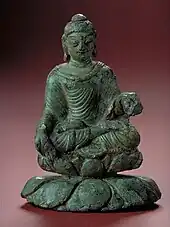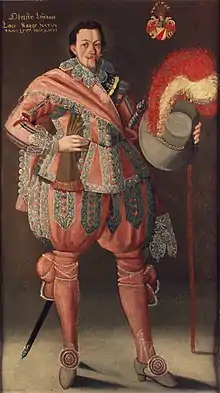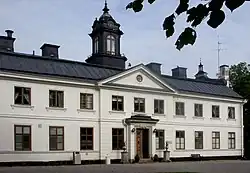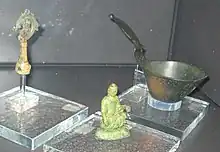Helgö
Helgö is an island in Ekerö Municipality in Stockholm County, Sweden. Helgö is an island situated in the lake Mälaren. The island's greatest width is about 1.5 km (0.9 mi), it is about 5 kilometres (3.1 miles) long and covers 48 hectares (119 acres).

Excavations at Helgö

The island is perhaps best known for a major archaeological area. The old trading town on Helgö began to emerge around the year 200 AD, 500 years before Birka at Björkö. The first archaeological dig in 1954 uncovered the remains of the early settlement, including a workshop area which attracted international interest. The most notable finds included a small Buddha statuette from North India and a christening scoop from Egypt, both dating from the 6th century. The Indian Buddha statuette, the Irish crozier and the Egyptian Coptic scoop which were found on Helgö, are presently on display in the Swedish History Museum in Stockholm.[1][2]
Kaggeholm Castle

The site where Kaggeholm Castle (Kaggeholms slott) is located was first mentioned in a land title document in 1287. During the 1500s the farm was owned by members of the families Grip and Bååt.[3][4]
In 1647, Count Lars Kagg (1595–1661) acquired an estate which he named Kaggeholm. Kagg was a political ally of King Gustavus Adolphus, a member of the Privy Council of Sweden and Field Marshal during the Thirty Years' War.[5][6]
The château-style manor house was built in 1725 after drawings and designs by Baroque architect Nicodemus Tessin the Younger (1654–1728).[7]
Since 1939 it had been owned by the Swedish Pentecostal movement and is used as a training center by nearby Kaggeholm College (Kaggeholms folkhögskola).[8][9]
Today Kaggeholm is operated as a conference center managed by the Swedish property development company Sisyfosgruppen Holding.[10]
Royal Swedish Academy volumes
The findings from the excavations at Helgö have been reported in a series of volumes published by the Royal Swedish Academy of Letters, History and Antiquities, beginning with Volume 1 covering the period 1954–1956. Volume 18, the final volume in the series, was published in 2011.[11]
Images
 Kaggeholm castle on Helgö |  Road sign to Helgö |  Archaeological objects from Helgö |  Helgö canal |
References
- Viking with a Buddha (A Dozen articles on Asian Arts)
- The Buddha in Viking Sweden (Beachcombing)
- "The noble Grip family". planet.nl. Retrieved February 1, 2020.
- "Bååt". Nordisk familjebok. Retrieved February 1, 2020.
- Matrikel öfwer Swea rikes ridderskap och adel
- "Lars Kagg". lokalhistoriewiki.no. Retrieved February 1, 2020.
- "Tessin, Nikodemus, d.y." Svenskt biografiskt handlexikon. Retrieved February 1, 2020.
- Kaggeholms slott (Kaggeholms folkhögskola) Archived 2010-08-13 at the Wayback Machine
- "Sisyfosgruppen Holding AB". allabolag.se. Retrieved February 1, 2020.
- "Sisyfosgruppen Holding AB". allabolag.se. Retrieved February 1, 2020.
- Excavations at Helgö XVIII: Conclusions and New Aspects, Royal Swedish Academy.
Further reading
- Gyllensvärd, Bo (2008) Excavations at Helgö XVII Exotic & Sacral Finds from Helgö (Almqvist & Wiksell) ISBN 978-91-7402-370-1